
JOURNAL OF FINANCIAL ECONOMICS
Scope & Guideline
Uncovering cutting-edge studies in financial economics.
Introduction
Aims and Scopes
- Financial Markets and Instruments:
The journal covers various aspects of financial markets, including equity, debt, derivatives, and alternative investments. It emphasizes the pricing, valuation, and trading strategies of these instruments. - Monetary Policy and Economic Impacts:
Research on how monetary policy influences financial markets, economic stability, and growth is a core area. This includes analyses of central bank actions, interest rates, inflation, and their effects on different economic sectors. - Corporate Finance and Governance:
The journal explores corporate finance issues, including capital structure, dividend policies, mergers and acquisitions, and governance structures. It investigates how these factors influence firm performance and shareholder value. - Risk Management and Financial Stability:
A significant focus is placed on risk management strategies, systemic risk, and the stability of financial institutions. This includes studies on the implications of financial crises and regulatory frameworks. - Sustainability and ESG Factors:
The journal increasingly addresses the integration of environmental, social, and governance (ESG) factors into financial decision-making, exploring the impact of sustainable practices on corporate performance and investment strategies. - Emerging Markets and Global Finance:
Research on emerging markets is prominent, examining their financial systems, investment opportunities, and integration into the global economy. This includes exploring the challenges and dynamics unique to these markets.
Trending and Emerging
- Cryptocurrency and Blockchain Technologies:
Research on cryptocurrencies, blockchain technology, and their implications for financial markets is rapidly increasing. This includes studies on market efficiency, investment behaviors, and regulatory challenges associated with digital currencies. - Sustainable Finance and ESG Integration:
There is a notable trend towards integrating sustainability and ESG factors into financial decision-making. This encompasses research on the financial performance of sustainable investments and the impact of corporate social responsibility. - Behavioral Finance:
Behavioral finance is gaining traction, with studies exploring how psychological factors influence investment decisions, market anomalies, and financial crises. This includes examining investor sentiment and its effects on asset pricing. - Machine Learning and AI in Finance:
The application of machine learning and artificial intelligence in financial modeling and risk assessment is emerging as a significant theme. Researchers are exploring how these technologies can enhance predictive capabilities and efficiency in financial markets. - Global Economic Uncertainty and Financial Stability:
Research focusing on the impacts of global economic uncertainty, including geopolitical risks and pandemics, on financial stability and market dynamics is increasingly relevant. This encompasses analyses of market reactions to economic shocks.
Declining or Waning
- Traditional Banking Practices:
With the rise of fintech and alternative financial services, traditional banking practices and their implications for financial stability are receiving less focus. Research is increasingly directed towards innovative banking models and digital finance. - Conventional Risk Assessment Models:
As financial markets evolve, the reliance on conventional risk assessment models is waning. There is a growing demand for more dynamic and adaptive models that account for the complexities of modern financial environments. - Static Economic Models:
The use of static economic models that do not incorporate time-varying or dynamic factors is declining. Researchers are favoring methodologies that account for volatility and the changing nature of economic relationships. - Focus on Developed Markets:
Research concentrated solely on developed markets is becoming less prevalent. The emphasis is shifting towards comparative studies that include emerging markets and their unique challenges.
Similar Journals
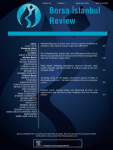
Borsa Istanbul Review
Navigating the complexities of emerging markets.Borsa Istanbul Review, published by ELSEVIER, is a premier open-access journal making significant contributions to the field of Economics and Finance since its inception in 2013. With a commendable Q1 rating in both categories according to the 2023 metrics, this journal ranks impressively at #36 out of 317 in Finance and #91 out of 716 in Economics and Econometrics on Scopus, placing it in the top tier of international academic publications. The journal not only provides a platform for rigorous and innovative research but also aims to foster a deeper understanding of the evolving economic landscape, particularly within the frameworks of emerging markets. Catering to researchers, professionals, and students alike, Borsa Istanbul Review is dedicated to delivering high-quality, peer-reviewed scholarly articles that are freely accessible to enhance global research collaboration. It serves as an essential resource for anyone looking to stay abreast of cutting-edge developments in the financial and economic sectors.
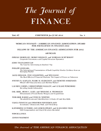
JOURNAL OF FINANCE
Innovative insights for a dynamic financial landscape.JOURNAL OF FINANCE, published by Wiley, stands as a premier academic journal in the fields of finance, economics, and accounting. With a history dating back to 1946, the journal has consistently delivered impactful research that shapes financial theory and practice, boasting an impressive impact factor reflective of its high citation rate. Its Quartile 1 ranking in Accounting, Economics and Econometrics, and Finance illustrates its leading position within these disciplines. Although not an open access publication, the journal continues to be indispensable for researchers, professionals, and students seeking to advance their understanding and knowledge through rigorous empirical analysis and comprehensive reviews. With an esteemed global readership, the JOURNAL OF FINANCE remains committed to fostering the dissemination of innovative financial research well into 2024 and beyond.

European Journal of Finance
Pioneering research that informs financial practice.European Journal of Finance is a prestigious publication specializing in the domains of finance, economics, and econometrics, published by Routledge Journals, Taylor & Francis Ltd. Established in 1995, this journal has become a vital resource for researchers, practitioners, and students, contributing significantly to the understanding of financial systems and markets. With its Q1 ranking in the Economics, Econometrics and Finance category, it stands out for its rigorous peer-reviewed articles that explore innovative theories, models, and empirical studies. The journal's impressive Scopus ranking of 35 out of 242 highlights its impact and relevance within the field, with an 85th percentile standing that underscores its importance to current financial research. Although it does not offer open access, the European Journal of Finance remains a cornerstone for those seeking to delve deeper into the complexities of finance, equipped with insights that drive both academic inquiry and practical application.
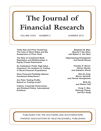
JOURNAL OF FINANCIAL RESEARCH
Exploring the Frontiers of Financial InnovationThe JOURNAL OF FINANCIAL RESEARCH, published by WILEY, stands as a pivotal platform for disseminating innovative research in the fields of finance and accounting since its inception in 1978. With an ISSN of 0270-2592 and an E-ISSN of 1475-6803, this journal aims to address contemporary challenges and trends within the financial research landscape. It has achieved notable recognition, being placed in the Q2 category for both Finance and Accounting in the 2023 rankings, signifying its relevance and impact within the academic community. Although it does not currently offer open access, the journal is accessible through various academic databases, catering to a diverse audience of researchers, professionals, and students keen on advancing their knowledge and understanding of financial systems and methodologies. With an evolving scope that encompasses empirical studies, theoretical frameworks, and practical applications, the JOURNAL OF FINANCIAL RESEARCH is committed to contributing valuable insights into the complexities of financial practices and policies.
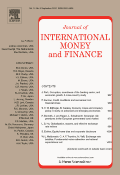
JOURNAL OF INTERNATIONAL MONEY AND FINANCE
Innovating understanding in the world of finance.JOURNAL OF INTERNATIONAL MONEY AND FINANCE is a premier scholarly publication dedicated to advancing the understanding of international finance and monetary economics. Published by Elsevier Science Ltd, this esteemed journal has been disseminating critical research since its inception in 1982 and will continue to contribute to the field through 2024. With a strong international presence and headquarters in the United Kingdom, the journal boasts an impressive collection of articles that explore significant trends, challenges, and innovations in the areas of economics and finance. Recognized for its impact, it ranks in the top quartile (Q1) in both the Economics and Econometrics and Finance categories as of 2023, signifying its influence and relevance among peers. Researchers, professionals, and students in these disciplines can benefit from the journal's rigorous peer-review process, ensuring high-quality scholarly outputs. Though not currently an open-access journal, it provides various subscription options to foster access to groundbreaking research in the financial ecosystem.
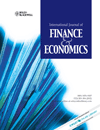
INTERNATIONAL JOURNAL OF FINANCE & ECONOMICS
Empowering Scholars, Shaping DiscoursesInternational Journal of Finance & Economics, published by Wiley, is a premier academic journal that serves as a vital resource for researchers and professionals in the fields of finance, accounting, and economics. With an impressive impact factor and a reputation for excellence, the journal is recognized in the 2023 Scopus rankings, placing in the top quartiles across multiple categories, including Q2 in Accounting, Economics, and Finance. The journal has been a significant contributor to academic discourse since its inception in 1996, with its converged years extending to 2024, thereby ensuring the continuous advancement of knowledge in these critical areas. Although it operates under a traditional subscription model, its comprehensive articles provide insightful analyses, empirical research, and theoretical advancements that cater to a diverse audience—from seasoned scholars to emerging students in the field.

International Journal of Financial Studies
Empowering finance research through open access.The International Journal of Financial Studies is a premier publication dedicated to advancing the field of finance through open-access research. Published by MDPI based in Switzerland, this journal offers researchers, professionals, and students a platform to disseminate their findings in an accessible format since its establishment in 2013. With its ISSN of 2227-7072 and a commendable impact reflected in its Q2 ranking in finance, it occupies an influential position among finance-related journals, as evidenced by its 65th percentile rank in Scopus. The journal encompasses a wide array of topics in finance, making it essential reading for those seeking to stay abreast of current research trends and methodologies. As an open-access journal, all articles are freely available, significantly enhancing the visibility and reach of published studies, which is crucial for fostering collaboration and innovation within the global financial community. Published continuously until 2024, the International Journal of Financial Studies is not just a source of knowledge; it is a critical contributor to the progression of financial scholarship.
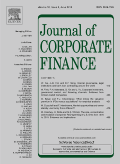
JOURNAL OF CORPORATE FINANCE
Unveiling the Dynamics of Corporate Finance ExcellenceJOURNAL OF CORPORATE FINANCE, published by Elsevier, is a premier academic journal that represents the forefront of research in the fields of corporate finance, economics, and management strategies. With an impressive Q1 ranking across multiple categories and a 95th percentile standing in Scopus rankings, this journal is pivotal for advancing knowledge and fostering discourse among scholars, practitioners, and students globally. The Journal has been in continuous publication since 1994 and welcomes submissions that contribute to the understanding of corporate finance and related disciplines. Although it operates under a traditional access model, the Journal offers a rich repository of research outcomes pivotal for informed decision-making in corporate environments. Researchers and professionals looking to enhance their understanding of contemporary finance phenomena will find the JOURNAL OF CORPORATE FINANCE an invaluable resource.
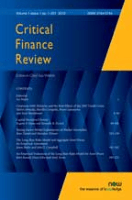
Critical Finance Review
Transforming finance through critical analysis and innovative thought.Critical Finance Review is a premier academic journal dedicated to advancing the field of finance through the publication of high-quality research that spans various dimensions of the discipline. Published by NOW PUBLISHERS INC, this journal has quickly established itself as a leading source of innovative finance scholarship, achieving a notable Q1 classification in the 2023 finance category. Operating under a rigorous peer-review process, the journal ensures the academic integrity and relevance of its content, which attracts contributions from both emerging and established scholars. With an ISSN of 2164-5744 and E-ISSN 2164-5760, it is accessible to a global audience, though it operates under traditional access models. The journal welcomes a diverse range of topics including, but not limited to, risk management, financial markets, and quantitative finance, making it an essential resource for researchers, professionals, and students who are keen to explore the complexities of financial systems and develop new insights in the ever-evolving landscape of finance. Based in the United States, Critical Finance Review holds a significant position within the academic community, fostering a collaborative environment that encourages innovative thinking and practical applications of financial theories.
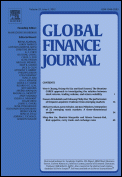
Global Finance Journal
Uncovering insights that shape financial landscapes.Global Finance Journal is an esteemed periodical published by Elsevier, dedicated to the dynamic fields of finance and economics. With an impressive history spanning from 1989 to 2024, this journal holds a significant position in the academic community, boasting a Q1 quartile ranking in both Economics and Econometrics, as well as Finance, as of 2023. It is highly regarded in Scopus rankings, placing 40th out of 317 in Finance and 99th out of 716 in Economics and Econometrics, demonstrating its influence and reach among researchers and practitioners alike. Although not an open-access journal, the Global Finance Journal provides rigorous peer-reviewed articles that explore critical issues, advance theoretical frameworks, and address practical applications in global finance. As such, it serves as a vital resource for researchers, financial professionals, and students aiming to deepen their understanding of economic phenomena and contribute to the ongoing discourse in these vibrant disciplines.